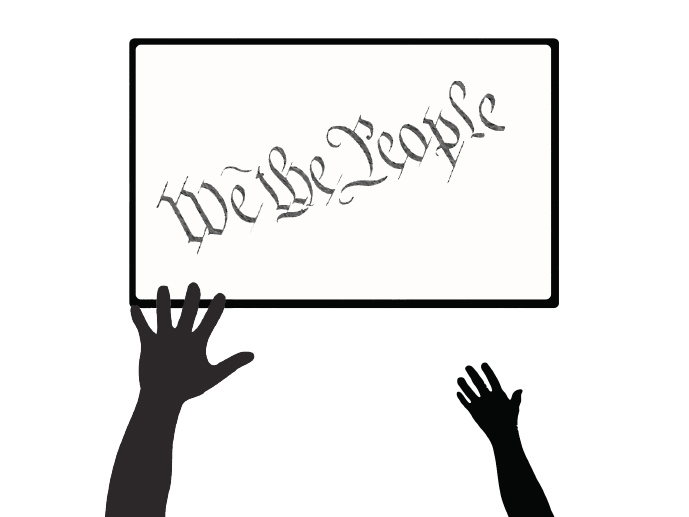Burton: Utah Needs to Reemphasize Civics Education
“Instead of rolling back requirements, the Utah Legislature should expand and improve its civics courses to invest in a more educated and engaged generation of future voters.” (Illustration by Alex Garcia | Daily Utah Chronicle)
February 18, 2020
Civics courses are a mainstay in many American high schools. These classes educate students on many topics including government, media, elections and political participation. These courses seek to aid younger generations in understanding the impact government has on them and how they can become active participants in governmental affairs. Most states require civics courses for high school graduation. Utah, however, may change their civics requirements for graduation. Utah Representative Elizabeth Weight has proposed H.B. 152, which would repeal the civics exam requirement for a GED, high school or adult education diploma. Recently, there has been a decline in media and governmental trust, but removing the civics requirement would be a mistake. Instead of removing requirements, Utah should reinforce the role of civics education.
A Surprising Lack of Knowledge
Many Americans are actually somewhat unknowledgeable of basic civic, historical and governmental facts. According to a 2019 survey conducted by the Annenberg Public Policy Center, only 39% of American adults could name all three branches of the government. Utah follows similar trends. A survey conducted in 2013 by BYU political science professor Adam Brown noted that only 42% of the Utahns surveyed could match high-ranking national politicians to their federal offices and only 15% of Utahns could do the same for high-ranking for Utah politicians. The public needs to be educated on how government works in order to demand change from its representatives. The founding fathers recognized the role education plays in civic life and responsible government. Samuel Adams wrote, “It is an object of vast magnitude that systems of education should be adopted and pursued which may not only diffuse a knowledge of the sciences but may implant in the minds of the American youth the principles of virtue and of liberty and inspire them with just and liberal ideas of government and with an inviolable attachment to their own country.”
Engaging an Inactive Voter Base
Civic engagement is critical in a democratic republic like the United States. Citizens must be active in the process. Unfortunately, American political participation rates in local politics remain low. Despite a rather high registration rate of 86.8%, Pew Research Center found that voter turnout during the 2016 presidential election was only 55.7%. Utah ranks high among states in political engagement and has significantly improved its voter turnout rates in comparison to other states, but voter turnout is still less than optimal. Sufficient electoral participation is difficult to achieve and the reasons why some people do not vote are complex, but one of the most obvious reasons for turnout is a lack of constituent enthusiasm. Civics education has been shown to combat apathy effectively. Democracy Prep, a public charter school network that emphasizes civics, doubled the likelihood of its students registering and voting. Effective civics education teaches students that engagement with the government is a responsibility within their reach and it can increase youth participation rates.
Repairing Political Efficacy
Political efficacy — or the belief that one’s vote matters in determining elections and policy — motivates civic engagement. The political efficacy of the average U.S. voter is around 50% — not terrible, but by no means is it enviable. Civic education can give students exposure and confidence with civic engagement. Classes provide moments for community service and activism, extending beyond just theory. Utah does quite well by providing effective civic classes, though there is room for improvement. Washington, D.C.-based think tank Center for American Progress observed that “strong civics education and integrated voter engagement programs can help to address widespread alienation by connecting voting to the issues that affect people’s lives, by demystifying government, and by educating people on the electoral process and inviting them to participate.” Especially in the very fractured nature of politics today, it is through civics education that students can learn the ways they can make a substantial difference in the community.
Removing civics education requirements for a basic high school degree is a step in the wrong direction. Instead of rolling back requirements, the Utah Legislature should expand and improve its civics courses to invest in a more educated and engaged generation of future voters.








